Corporate Culture's Role in Strategy and Knowledge Management
VerifiedAdded on 2020/05/16
|26
|6497
|187
AI Summary
The focus of this academic exploration lies in dissecting critical components within management studies. Key areas include differentiating between leadership and management roles to understand their unique contributions to organizations. The assignment also examines how organizational structures influence firm performance by exploring key factors such as communication, hierarchy, and decision-making processes. Another vital aspect is understanding the impact of different leadership styles on staff retention in academic settings, providing insights into strategies that can enhance employee satisfaction and retention rates. Additionally, it looks at innovative management practices that foster effective outcomes in business operations, highlighting real-world applications and case studies. Finally, the assignment delves into how corporate culture interrelates with strategic planning and knowledge management to boost organizational effectiveness, emphasizing a holistic approach to managing successful enterprises.
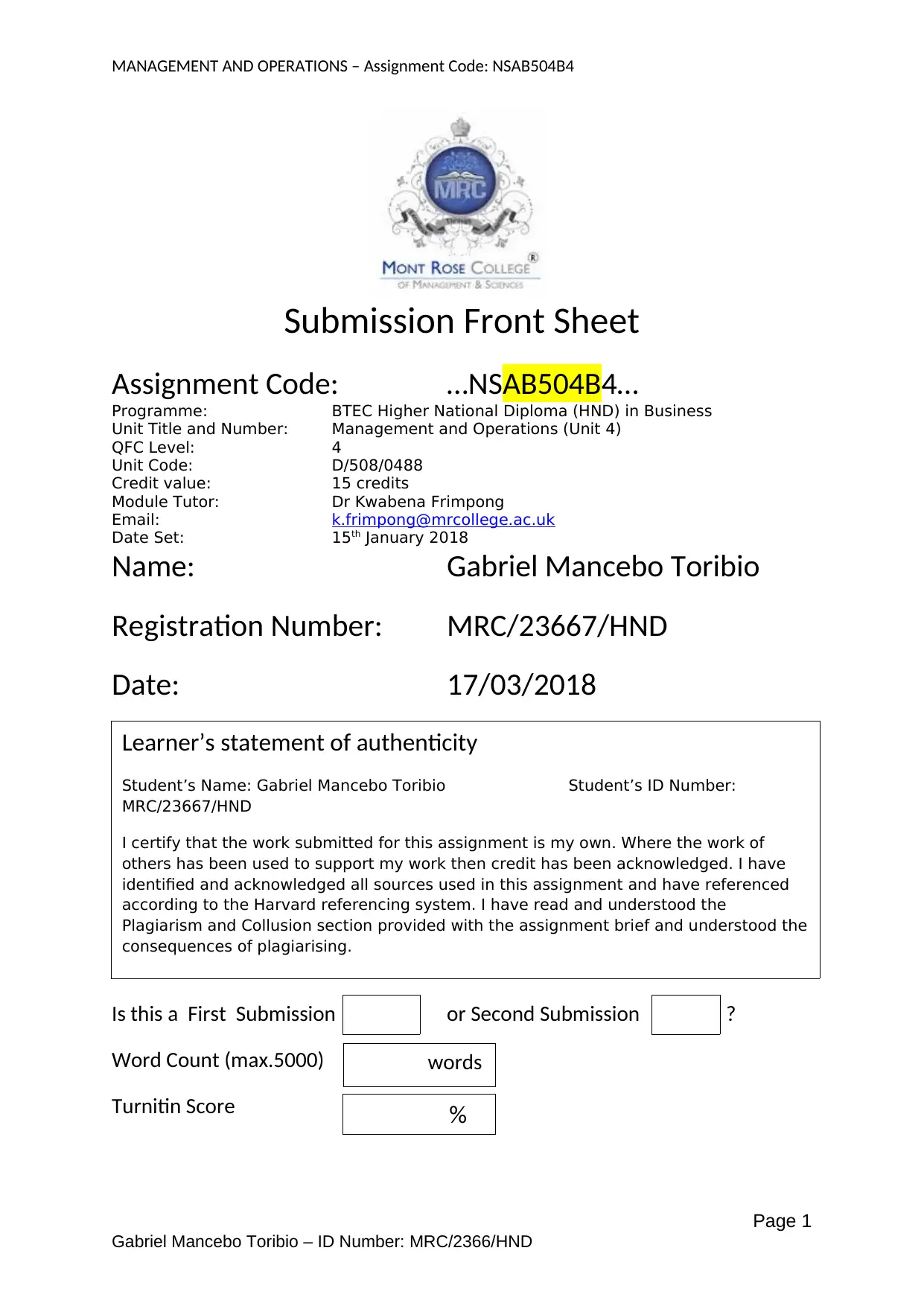
MANAGEMENT AND OPERATIONS – Assignment Code: NSAB504B4
Submission Front Sheet
Assignment Code: …NSAB504B4…
Programme: BTEC Higher National Diploma (HND) in Business
Unit Title and Number: Management and Operations (Unit 4)
QFC Level: 4
Unit Code: D/508/0488
Credit value: 15 credits
Module Tutor: Dr Kwabena Frimpong
Email: k.frimpong@mrcollege.ac.uk
Date Set: 15th January 2018
Name: Gabriel Mancebo Toribio
Registration Number: MRC/23667/HND
Date: 17/03/2018
Is this a First Submission or Second Submission ?
Word Count (max.5000)
Turnitin Score
Page 1
Gabriel Mancebo Toribio – ID Number: MRC/2366/HND
Learner’s statement of authenticity
Student’s Name: Gabriel Mancebo Toribio Student’s ID Number:
MRC/23667/HND
I certify that the work submitted for this assignment is my own. Where the work of
others has been used to support my work then credit has been acknowledged. I have
identified and acknowledged all sources used in this assignment and have referenced
according to the Harvard referencing system. I have read and understood the
Plagiarism and Collusion section provided with the assignment brief and understood the
consequences of plagiarising.
words
%
Submission Front Sheet
Assignment Code: …NSAB504B4…
Programme: BTEC Higher National Diploma (HND) in Business
Unit Title and Number: Management and Operations (Unit 4)
QFC Level: 4
Unit Code: D/508/0488
Credit value: 15 credits
Module Tutor: Dr Kwabena Frimpong
Email: k.frimpong@mrcollege.ac.uk
Date Set: 15th January 2018
Name: Gabriel Mancebo Toribio
Registration Number: MRC/23667/HND
Date: 17/03/2018
Is this a First Submission or Second Submission ?
Word Count (max.5000)
Turnitin Score
Page 1
Gabriel Mancebo Toribio – ID Number: MRC/2366/HND
Learner’s statement of authenticity
Student’s Name: Gabriel Mancebo Toribio Student’s ID Number:
MRC/23667/HND
I certify that the work submitted for this assignment is my own. Where the work of
others has been used to support my work then credit has been acknowledged. I have
identified and acknowledged all sources used in this assignment and have referenced
according to the Harvard referencing system. I have read and understood the
Plagiarism and Collusion section provided with the assignment brief and understood the
consequences of plagiarising.
words
%
Paraphrase This Document
Need a fresh take? Get an instant paraphrase of this document with our AI Paraphraser
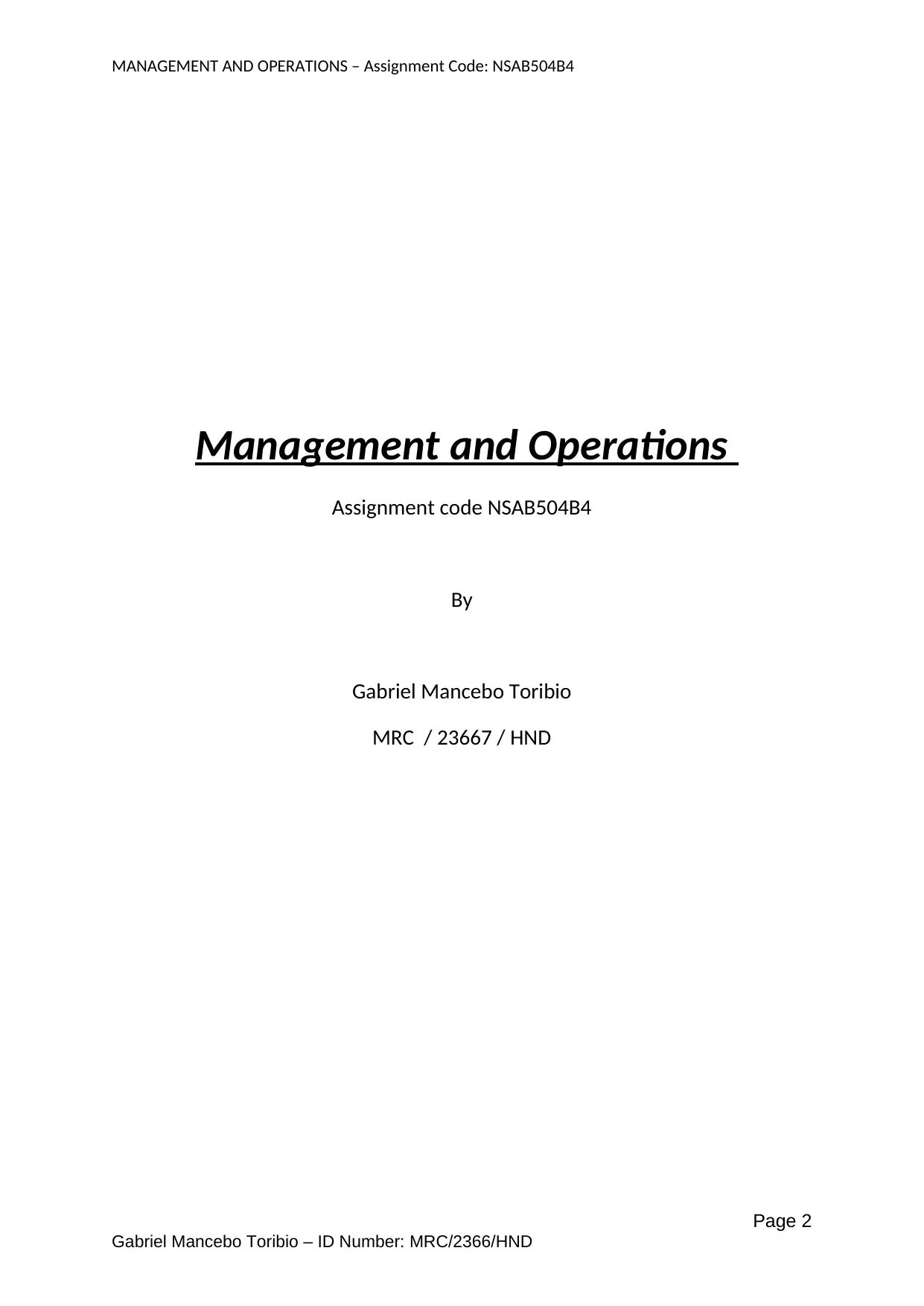
MANAGEMENT AND OPERATIONS – Assignment Code: NSAB504B4
Management and Operations
Assignment code NSAB504B4
By
Gabriel Mancebo Toribio
MRC / 23667 / HND
Page 2
Gabriel Mancebo Toribio – ID Number: MRC/2366/HND
Management and Operations
Assignment code NSAB504B4
By
Gabriel Mancebo Toribio
MRC / 23667 / HND
Page 2
Gabriel Mancebo Toribio – ID Number: MRC/2366/HND
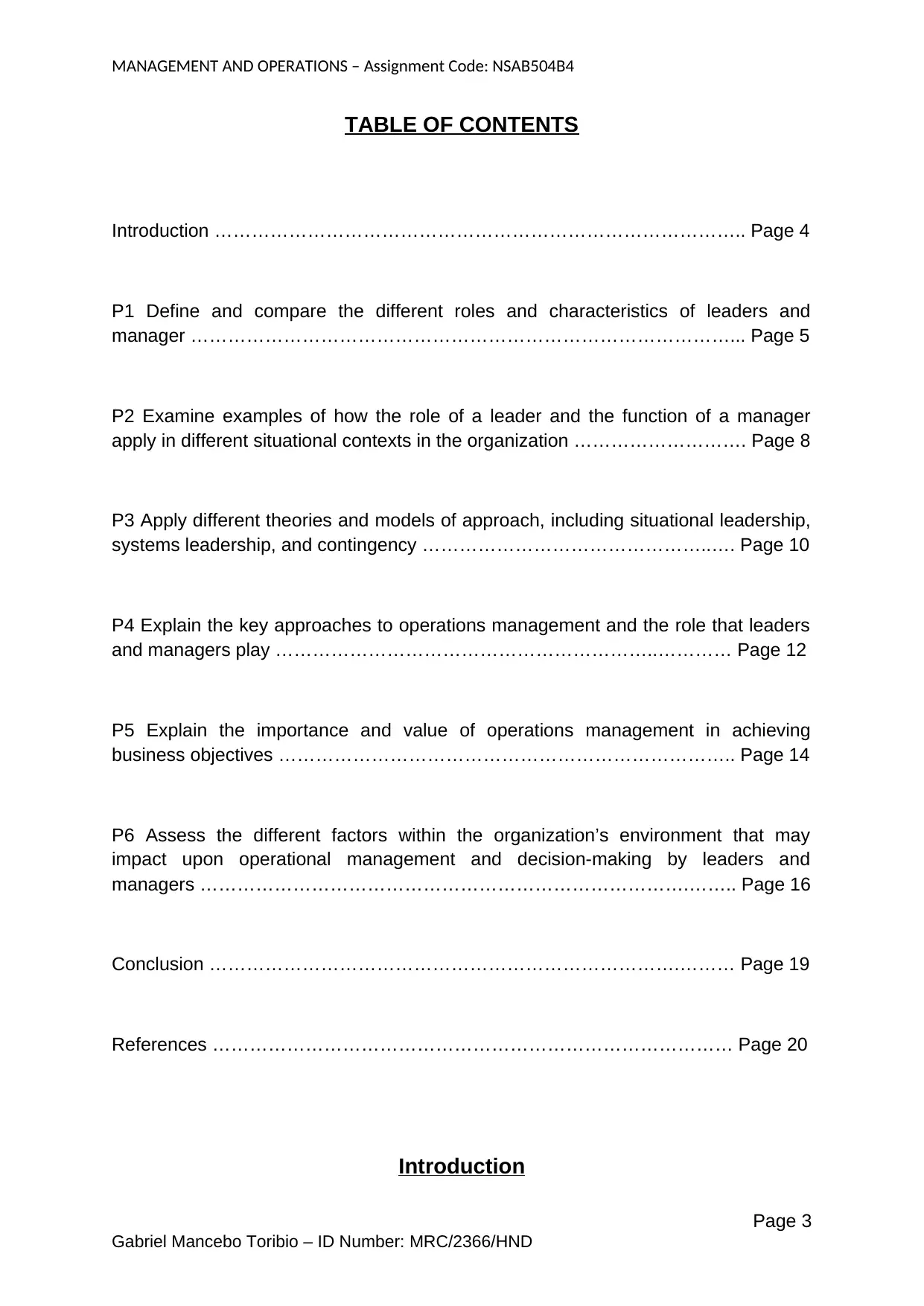
MANAGEMENT AND OPERATIONS – Assignment Code: NSAB504B4
TABLE OF CONTENTS
Introduction ………………………………………………………………………….. Page 4
P1 Define and compare the different roles and characteristics of leaders and
manager ……………………………………………………………………………... Page 5
P2 Examine examples of how the role of a leader and the function of a manager
apply in different situational contexts in the organization ………………………. Page 8
P3 Apply different theories and models of approach, including situational leadership,
systems leadership, and contingency ………………………………………..…. Page 10
P4 Explain the key approaches to operations management and the role that leaders
and managers play ……………………………………………………..………… Page 12
P5 Explain the importance and value of operations management in achieving
business objectives ……………………………………………………………….. Page 14
P6 Assess the different factors within the organization’s environment that may
impact upon operational management and decision-making by leaders and
managers …………………………………………………………………….…….. Page 16
Conclusion ………………………………………………………………….……… Page 19
References ………………………………………………………………………… Page 20
Introduction
Page 3
Gabriel Mancebo Toribio – ID Number: MRC/2366/HND
TABLE OF CONTENTS
Introduction ………………………………………………………………………….. Page 4
P1 Define and compare the different roles and characteristics of leaders and
manager ……………………………………………………………………………... Page 5
P2 Examine examples of how the role of a leader and the function of a manager
apply in different situational contexts in the organization ………………………. Page 8
P3 Apply different theories and models of approach, including situational leadership,
systems leadership, and contingency ………………………………………..…. Page 10
P4 Explain the key approaches to operations management and the role that leaders
and managers play ……………………………………………………..………… Page 12
P5 Explain the importance and value of operations management in achieving
business objectives ……………………………………………………………….. Page 14
P6 Assess the different factors within the organization’s environment that may
impact upon operational management and decision-making by leaders and
managers …………………………………………………………………….…….. Page 16
Conclusion ………………………………………………………………….……… Page 19
References ………………………………………………………………………… Page 20
Introduction
Page 3
Gabriel Mancebo Toribio – ID Number: MRC/2366/HND
⊘ This is a preview!⊘
Do you want full access?
Subscribe today to unlock all pages.

Trusted by 1+ million students worldwide
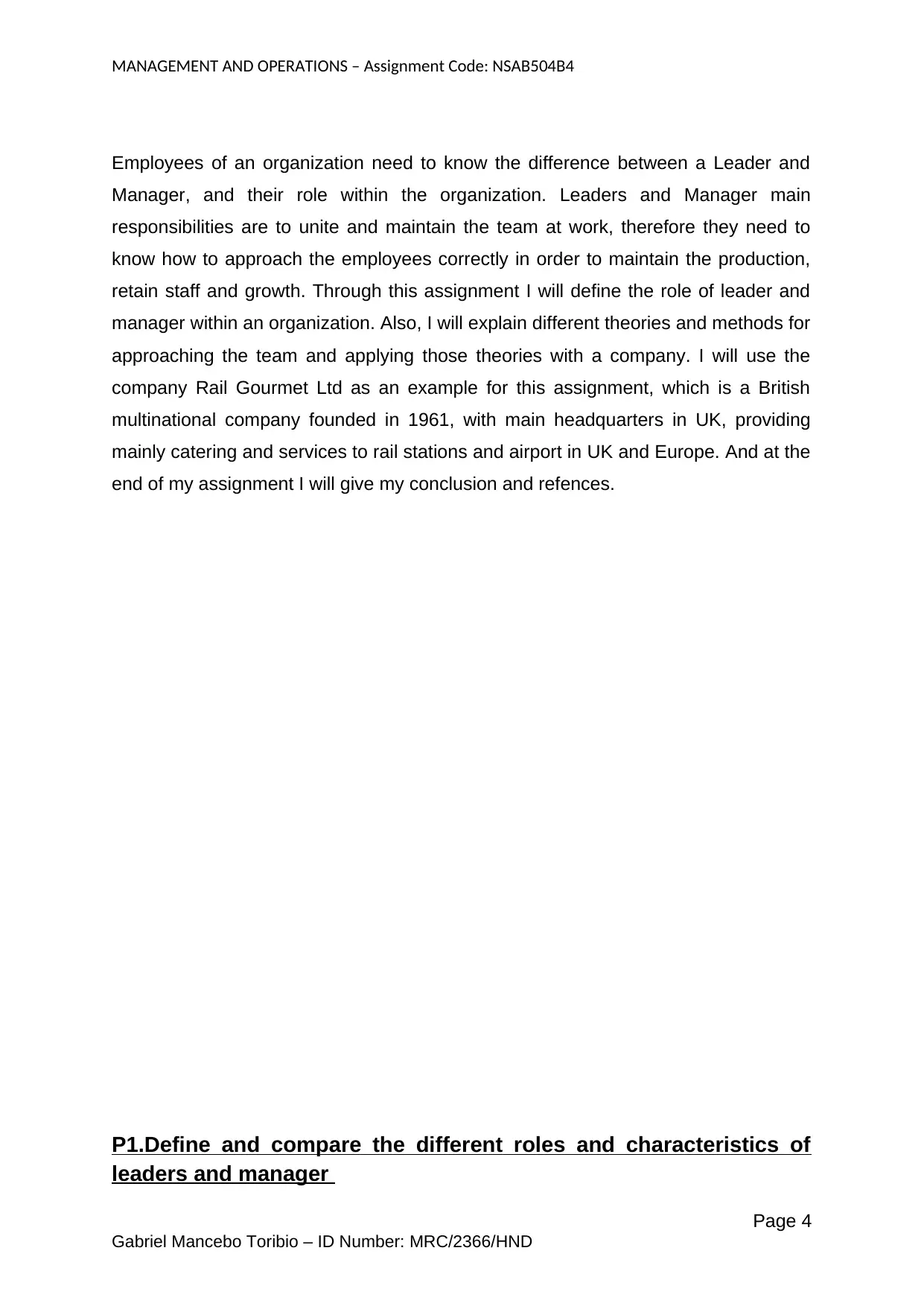
MANAGEMENT AND OPERATIONS – Assignment Code: NSAB504B4
Employees of an organization need to know the difference between a Leader and
Manager, and their role within the organization. Leaders and Manager main
responsibilities are to unite and maintain the team at work, therefore they need to
know how to approach the employees correctly in order to maintain the production,
retain staff and growth. Through this assignment I will define the role of leader and
manager within an organization. Also, I will explain different theories and methods for
approaching the team and applying those theories with a company. I will use the
company Rail Gourmet Ltd as an example for this assignment, which is a British
multinational company founded in 1961, with main headquarters in UK, providing
mainly catering and services to rail stations and airport in UK and Europe. And at the
end of my assignment I will give my conclusion and refences.
P1.Define and compare the different roles and characteristics of
leaders and manager
Page 4
Gabriel Mancebo Toribio – ID Number: MRC/2366/HND
Employees of an organization need to know the difference between a Leader and
Manager, and their role within the organization. Leaders and Manager main
responsibilities are to unite and maintain the team at work, therefore they need to
know how to approach the employees correctly in order to maintain the production,
retain staff and growth. Through this assignment I will define the role of leader and
manager within an organization. Also, I will explain different theories and methods for
approaching the team and applying those theories with a company. I will use the
company Rail Gourmet Ltd as an example for this assignment, which is a British
multinational company founded in 1961, with main headquarters in UK, providing
mainly catering and services to rail stations and airport in UK and Europe. And at the
end of my assignment I will give my conclusion and refences.
P1.Define and compare the different roles and characteristics of
leaders and manager
Page 4
Gabriel Mancebo Toribio – ID Number: MRC/2366/HND
Paraphrase This Document
Need a fresh take? Get an instant paraphrase of this document with our AI Paraphraser
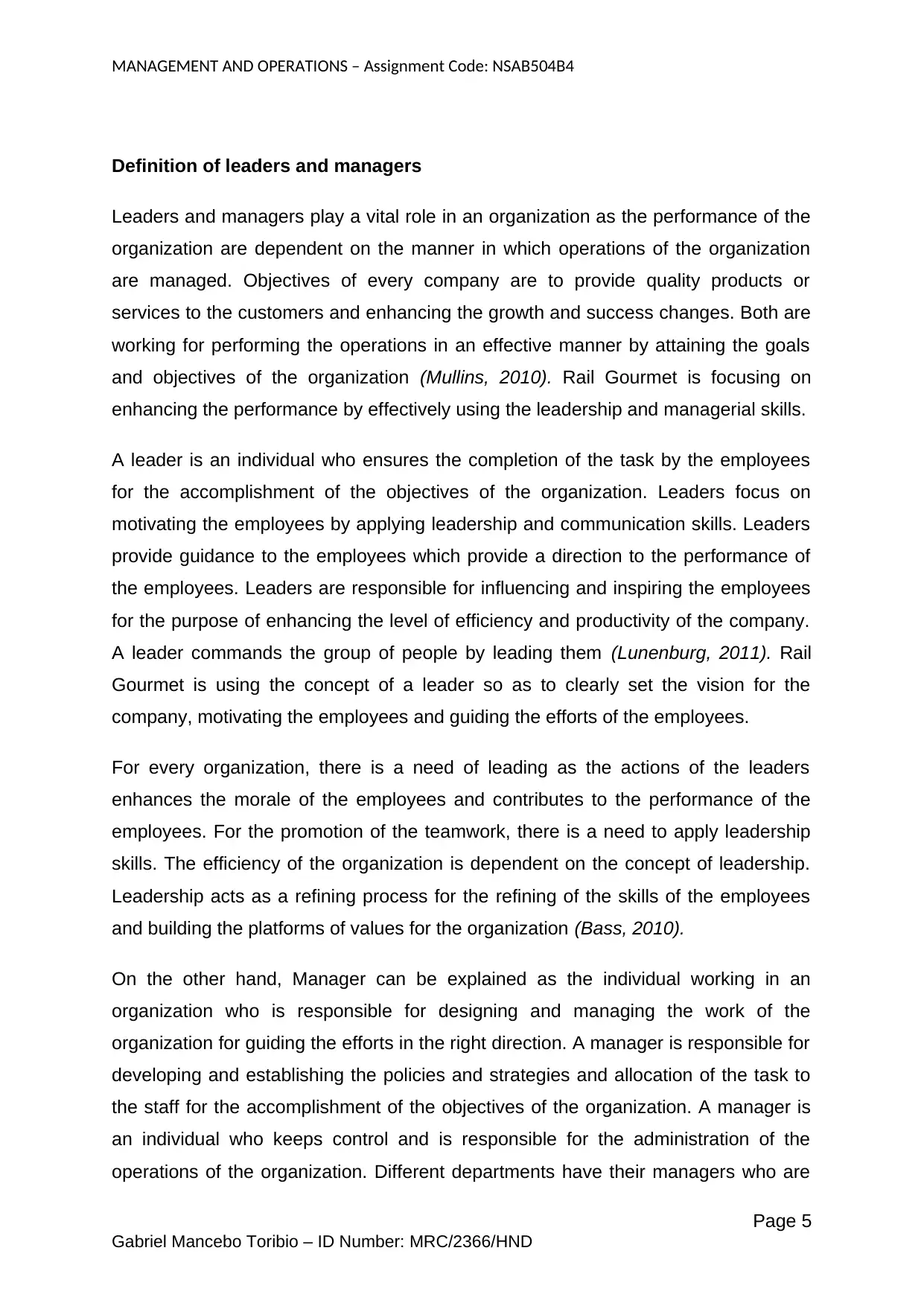
MANAGEMENT AND OPERATIONS – Assignment Code: NSAB504B4
Definition of leaders and managers
Leaders and managers play a vital role in an organization as the performance of the
organization are dependent on the manner in which operations of the organization
are managed. Objectives of every company are to provide quality products or
services to the customers and enhancing the growth and success changes. Both are
working for performing the operations in an effective manner by attaining the goals
and objectives of the organization (Mullins, 2010). Rail Gourmet is focusing on
enhancing the performance by effectively using the leadership and managerial skills.
A leader is an individual who ensures the completion of the task by the employees
for the accomplishment of the objectives of the organization. Leaders focus on
motivating the employees by applying leadership and communication skills. Leaders
provide guidance to the employees which provide a direction to the performance of
the employees. Leaders are responsible for influencing and inspiring the employees
for the purpose of enhancing the level of efficiency and productivity of the company.
A leader commands the group of people by leading them (Lunenburg, 2011). Rail
Gourmet is using the concept of a leader so as to clearly set the vision for the
company, motivating the employees and guiding the efforts of the employees.
For every organization, there is a need of leading as the actions of the leaders
enhances the morale of the employees and contributes to the performance of the
employees. For the promotion of the teamwork, there is a need to apply leadership
skills. The efficiency of the organization is dependent on the concept of leadership.
Leadership acts as a refining process for the refining of the skills of the employees
and building the platforms of values for the organization (Bass, 2010).
On the other hand, Manager can be explained as the individual working in an
organization who is responsible for designing and managing the work of the
organization for guiding the efforts in the right direction. A manager is responsible for
developing and establishing the policies and strategies and allocation of the task to
the staff for the accomplishment of the objectives of the organization. A manager is
an individual who keeps control and is responsible for the administration of the
operations of the organization. Different departments have their managers who are
Page 5
Gabriel Mancebo Toribio – ID Number: MRC/2366/HND
Definition of leaders and managers
Leaders and managers play a vital role in an organization as the performance of the
organization are dependent on the manner in which operations of the organization
are managed. Objectives of every company are to provide quality products or
services to the customers and enhancing the growth and success changes. Both are
working for performing the operations in an effective manner by attaining the goals
and objectives of the organization (Mullins, 2010). Rail Gourmet is focusing on
enhancing the performance by effectively using the leadership and managerial skills.
A leader is an individual who ensures the completion of the task by the employees
for the accomplishment of the objectives of the organization. Leaders focus on
motivating the employees by applying leadership and communication skills. Leaders
provide guidance to the employees which provide a direction to the performance of
the employees. Leaders are responsible for influencing and inspiring the employees
for the purpose of enhancing the level of efficiency and productivity of the company.
A leader commands the group of people by leading them (Lunenburg, 2011). Rail
Gourmet is using the concept of a leader so as to clearly set the vision for the
company, motivating the employees and guiding the efforts of the employees.
For every organization, there is a need of leading as the actions of the leaders
enhances the morale of the employees and contributes to the performance of the
employees. For the promotion of the teamwork, there is a need to apply leadership
skills. The efficiency of the organization is dependent on the concept of leadership.
Leadership acts as a refining process for the refining of the skills of the employees
and building the platforms of values for the organization (Bass, 2010).
On the other hand, Manager can be explained as the individual working in an
organization who is responsible for designing and managing the work of the
organization for guiding the efforts in the right direction. A manager is responsible for
developing and establishing the policies and strategies and allocation of the task to
the staff for the accomplishment of the objectives of the organization. A manager is
an individual who keeps control and is responsible for the administration of the
operations of the organization. Different departments have their managers who are
Page 5
Gabriel Mancebo Toribio – ID Number: MRC/2366/HND
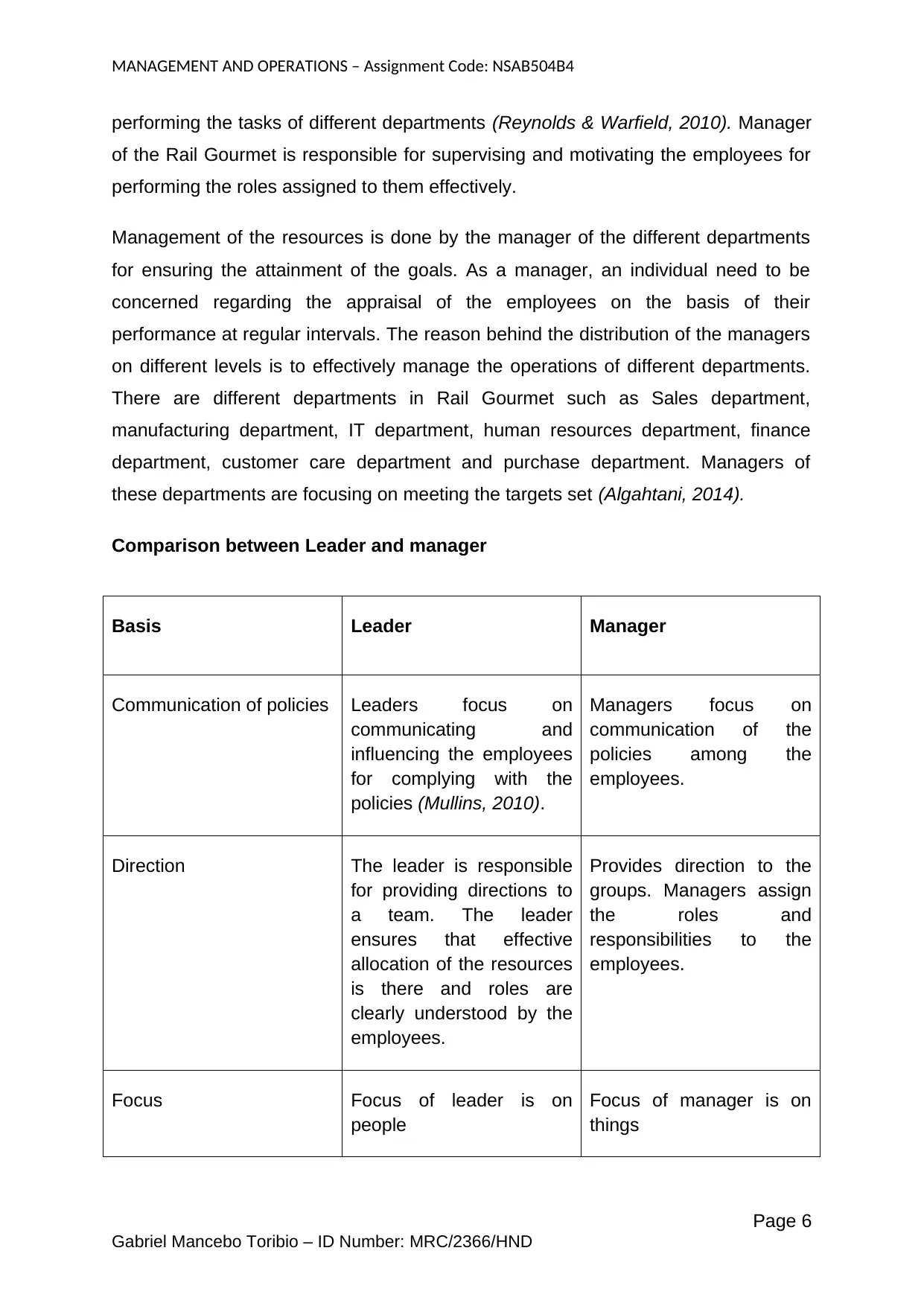
MANAGEMENT AND OPERATIONS – Assignment Code: NSAB504B4
performing the tasks of different departments (Reynolds & Warfield, 2010). Manager
of the Rail Gourmet is responsible for supervising and motivating the employees for
performing the roles assigned to them effectively.
Management of the resources is done by the manager of the different departments
for ensuring the attainment of the goals. As a manager, an individual need to be
concerned regarding the appraisal of the employees on the basis of their
performance at regular intervals. The reason behind the distribution of the managers
on different levels is to effectively manage the operations of different departments.
There are different departments in Rail Gourmet such as Sales department,
manufacturing department, IT department, human resources department, finance
department, customer care department and purchase department. Managers of
these departments are focusing on meeting the targets set (Algahtani, 2014).
Comparison between Leader and manager
Basis Leader Manager
Communication of policies Leaders focus on
communicating and
influencing the employees
for complying with the
policies (Mullins, 2010).
Managers focus on
communication of the
policies among the
employees.
Direction The leader is responsible
for providing directions to
a team. The leader
ensures that effective
allocation of the resources
is there and roles are
clearly understood by the
employees.
Provides direction to the
groups. Managers assign
the roles and
responsibilities to the
employees.
Focus Focus of leader is on
people
Focus of manager is on
things
Page 6
Gabriel Mancebo Toribio – ID Number: MRC/2366/HND
performing the tasks of different departments (Reynolds & Warfield, 2010). Manager
of the Rail Gourmet is responsible for supervising and motivating the employees for
performing the roles assigned to them effectively.
Management of the resources is done by the manager of the different departments
for ensuring the attainment of the goals. As a manager, an individual need to be
concerned regarding the appraisal of the employees on the basis of their
performance at regular intervals. The reason behind the distribution of the managers
on different levels is to effectively manage the operations of different departments.
There are different departments in Rail Gourmet such as Sales department,
manufacturing department, IT department, human resources department, finance
department, customer care department and purchase department. Managers of
these departments are focusing on meeting the targets set (Algahtani, 2014).
Comparison between Leader and manager
Basis Leader Manager
Communication of policies Leaders focus on
communicating and
influencing the employees
for complying with the
policies (Mullins, 2010).
Managers focus on
communication of the
policies among the
employees.
Direction The leader is responsible
for providing directions to
a team. The leader
ensures that effective
allocation of the resources
is there and roles are
clearly understood by the
employees.
Provides direction to the
groups. Managers assign
the roles and
responsibilities to the
employees.
Focus Focus of leader is on
people
Focus of manager is on
things
Page 6
Gabriel Mancebo Toribio – ID Number: MRC/2366/HND
⊘ This is a preview!⊘
Do you want full access?
Subscribe today to unlock all pages.

Trusted by 1+ million students worldwide
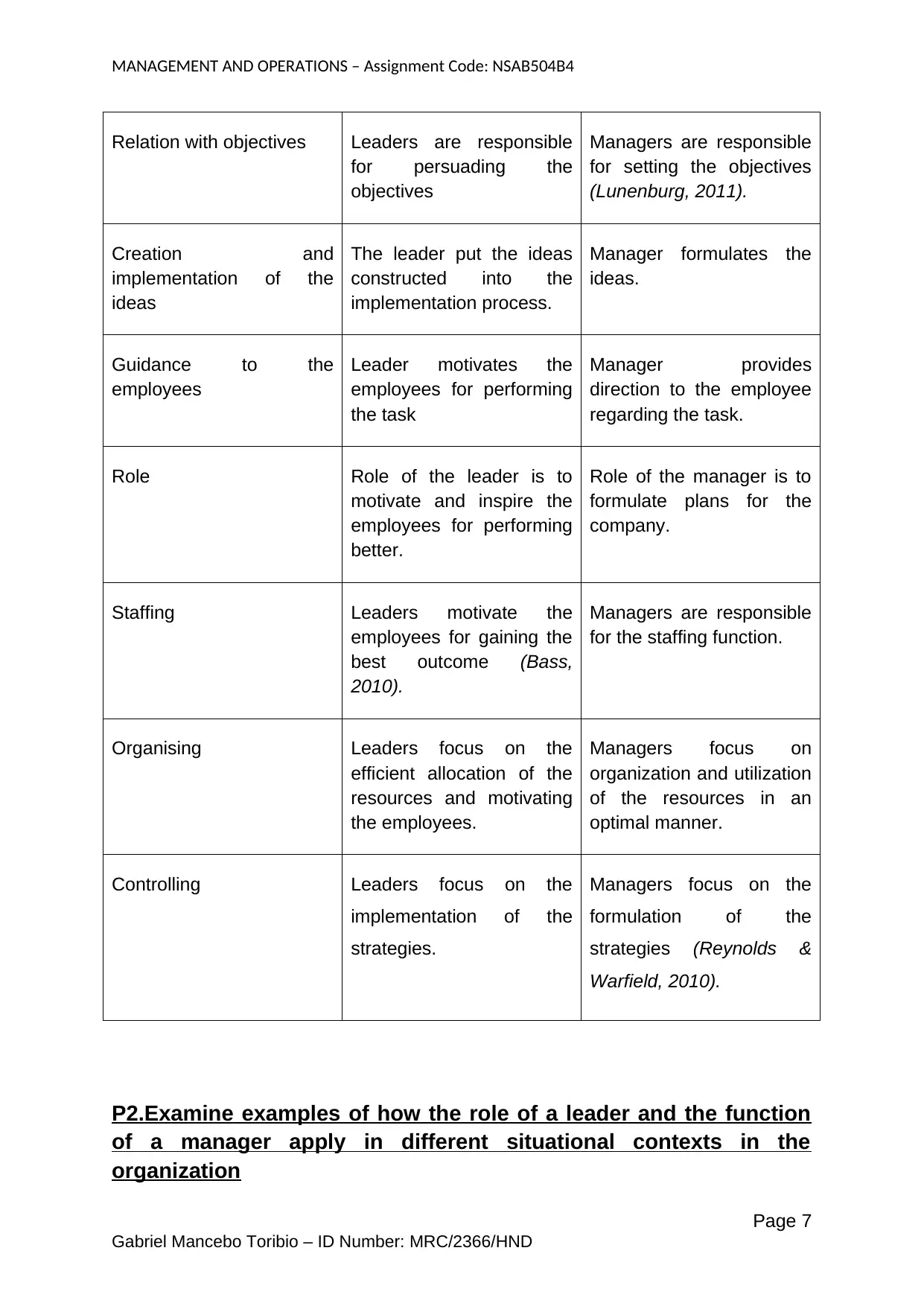
MANAGEMENT AND OPERATIONS – Assignment Code: NSAB504B4
Relation with objectives Leaders are responsible
for persuading the
objectives
Managers are responsible
for setting the objectives
(Lunenburg, 2011).
Creation and
implementation of the
ideas
The leader put the ideas
constructed into the
implementation process.
Manager formulates the
ideas.
Guidance to the
employees
Leader motivates the
employees for performing
the task
Manager provides
direction to the employee
regarding the task.
Role Role of the leader is to
motivate and inspire the
employees for performing
better.
Role of the manager is to
formulate plans for the
company.
Staffing Leaders motivate the
employees for gaining the
best outcome (Bass,
2010).
Managers are responsible
for the staffing function.
Organising Leaders focus on the
efficient allocation of the
resources and motivating
the employees.
Managers focus on
organization and utilization
of the resources in an
optimal manner.
Controlling Leaders focus on the
implementation of the
strategies.
Managers focus on the
formulation of the
strategies (Reynolds &
Warfield, 2010).
P2.Examine examples of how the role of a leader and the function
of a manager apply in different situational contexts in the
organization
Page 7
Gabriel Mancebo Toribio – ID Number: MRC/2366/HND
Relation with objectives Leaders are responsible
for persuading the
objectives
Managers are responsible
for setting the objectives
(Lunenburg, 2011).
Creation and
implementation of the
ideas
The leader put the ideas
constructed into the
implementation process.
Manager formulates the
ideas.
Guidance to the
employees
Leader motivates the
employees for performing
the task
Manager provides
direction to the employee
regarding the task.
Role Role of the leader is to
motivate and inspire the
employees for performing
better.
Role of the manager is to
formulate plans for the
company.
Staffing Leaders motivate the
employees for gaining the
best outcome (Bass,
2010).
Managers are responsible
for the staffing function.
Organising Leaders focus on the
efficient allocation of the
resources and motivating
the employees.
Managers focus on
organization and utilization
of the resources in an
optimal manner.
Controlling Leaders focus on the
implementation of the
strategies.
Managers focus on the
formulation of the
strategies (Reynolds &
Warfield, 2010).
P2.Examine examples of how the role of a leader and the function
of a manager apply in different situational contexts in the
organization
Page 7
Gabriel Mancebo Toribio – ID Number: MRC/2366/HND
Paraphrase This Document
Need a fresh take? Get an instant paraphrase of this document with our AI Paraphraser
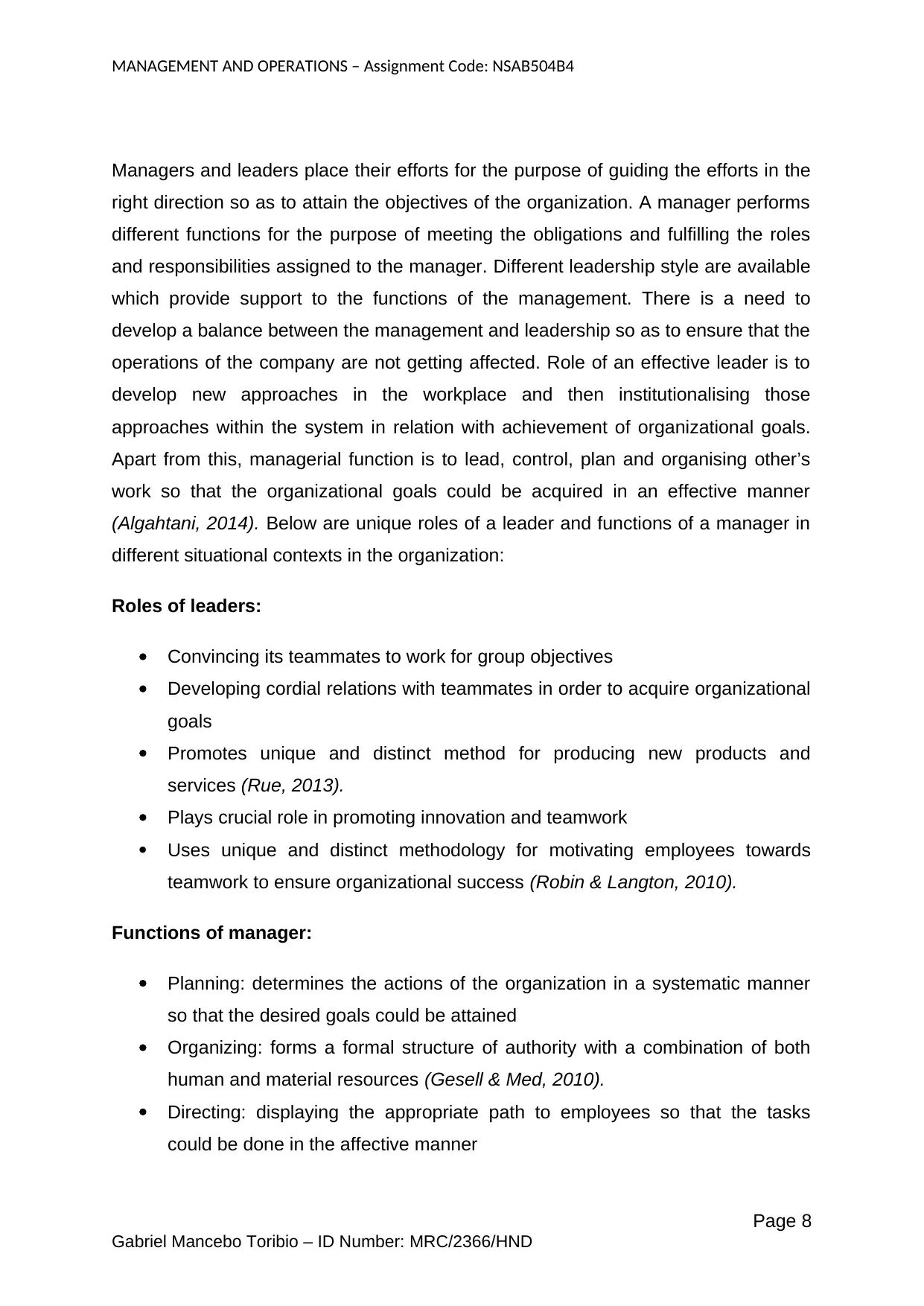
MANAGEMENT AND OPERATIONS – Assignment Code: NSAB504B4
Managers and leaders place their efforts for the purpose of guiding the efforts in the
right direction so as to attain the objectives of the organization. A manager performs
different functions for the purpose of meeting the obligations and fulfilling the roles
and responsibilities assigned to the manager. Different leadership style are available
which provide support to the functions of the management. There is a need to
develop a balance between the management and leadership so as to ensure that the
operations of the company are not getting affected. Role of an effective leader is to
develop new approaches in the workplace and then institutionalising those
approaches within the system in relation with achievement of organizational goals.
Apart from this, managerial function is to lead, control, plan and organising other’s
work so that the organizational goals could be acquired in an effective manner
(Algahtani, 2014). Below are unique roles of a leader and functions of a manager in
different situational contexts in the organization:
Roles of leaders:
Convincing its teammates to work for group objectives
Developing cordial relations with teammates in order to acquire organizational
goals
Promotes unique and distinct method for producing new products and
services (Rue, 2013).
Plays crucial role in promoting innovation and teamwork
Uses unique and distinct methodology for motivating employees towards
teamwork to ensure organizational success (Robin & Langton, 2010).
Functions of manager:
Planning: determines the actions of the organization in a systematic manner
so that the desired goals could be attained
Organizing: forms a formal structure of authority with a combination of both
human and material resources (Gesell & Med, 2010).
Directing: displaying the appropriate path to employees so that the tasks
could be done in the affective manner
Page 8
Gabriel Mancebo Toribio – ID Number: MRC/2366/HND
Managers and leaders place their efforts for the purpose of guiding the efforts in the
right direction so as to attain the objectives of the organization. A manager performs
different functions for the purpose of meeting the obligations and fulfilling the roles
and responsibilities assigned to the manager. Different leadership style are available
which provide support to the functions of the management. There is a need to
develop a balance between the management and leadership so as to ensure that the
operations of the company are not getting affected. Role of an effective leader is to
develop new approaches in the workplace and then institutionalising those
approaches within the system in relation with achievement of organizational goals.
Apart from this, managerial function is to lead, control, plan and organising other’s
work so that the organizational goals could be acquired in an effective manner
(Algahtani, 2014). Below are unique roles of a leader and functions of a manager in
different situational contexts in the organization:
Roles of leaders:
Convincing its teammates to work for group objectives
Developing cordial relations with teammates in order to acquire organizational
goals
Promotes unique and distinct method for producing new products and
services (Rue, 2013).
Plays crucial role in promoting innovation and teamwork
Uses unique and distinct methodology for motivating employees towards
teamwork to ensure organizational success (Robin & Langton, 2010).
Functions of manager:
Planning: determines the actions of the organization in a systematic manner
so that the desired goals could be attained
Organizing: forms a formal structure of authority with a combination of both
human and material resources (Gesell & Med, 2010).
Directing: displaying the appropriate path to employees so that the tasks
could be done in the affective manner
Page 8
Gabriel Mancebo Toribio – ID Number: MRC/2366/HND
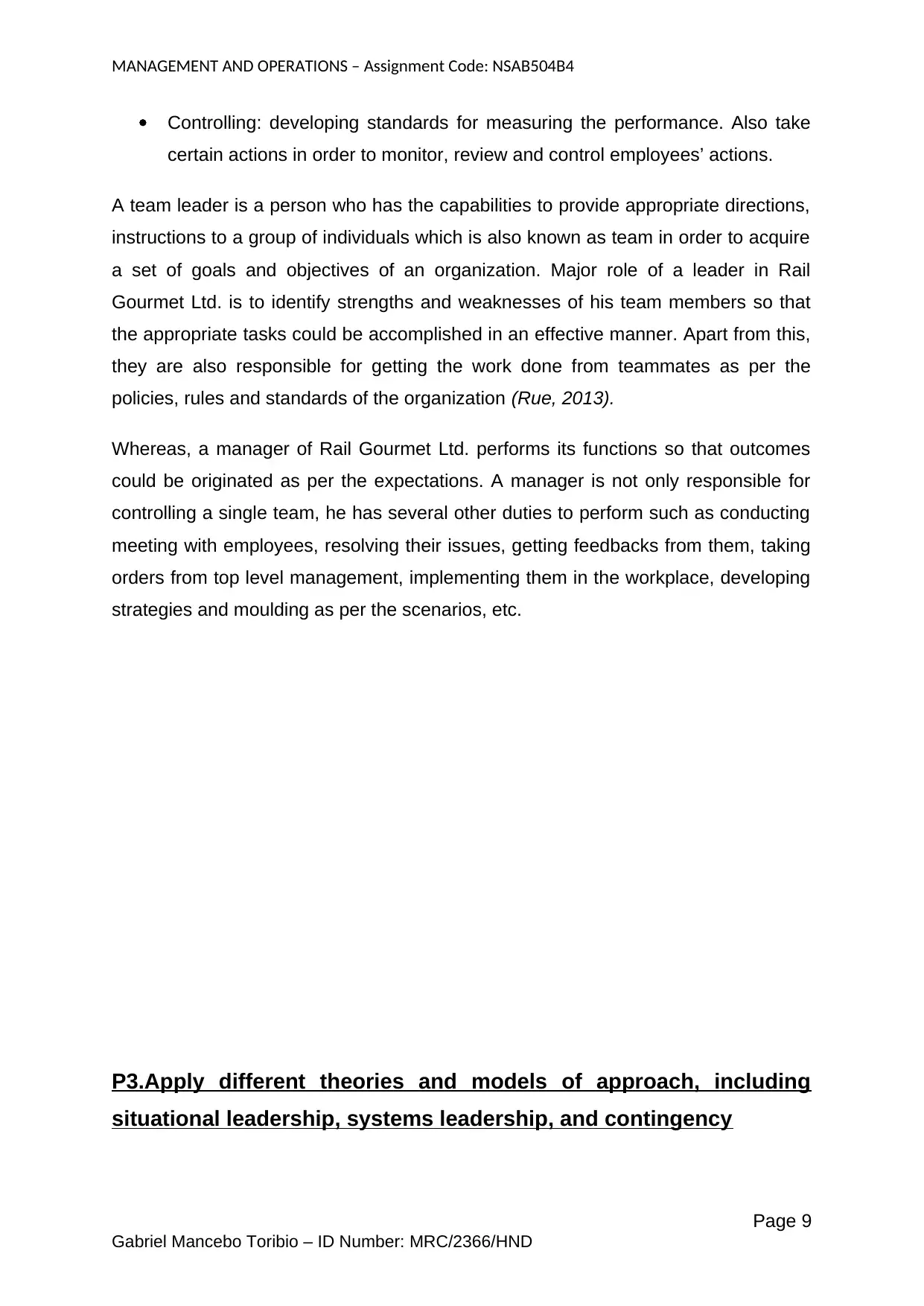
MANAGEMENT AND OPERATIONS – Assignment Code: NSAB504B4
Controlling: developing standards for measuring the performance. Also take
certain actions in order to monitor, review and control employees’ actions.
A team leader is a person who has the capabilities to provide appropriate directions,
instructions to a group of individuals which is also known as team in order to acquire
a set of goals and objectives of an organization. Major role of a leader in Rail
Gourmet Ltd. is to identify strengths and weaknesses of his team members so that
the appropriate tasks could be accomplished in an effective manner. Apart from this,
they are also responsible for getting the work done from teammates as per the
policies, rules and standards of the organization (Rue, 2013).
Whereas, a manager of Rail Gourmet Ltd. performs its functions so that outcomes
could be originated as per the expectations. A manager is not only responsible for
controlling a single team, he has several other duties to perform such as conducting
meeting with employees, resolving their issues, getting feedbacks from them, taking
orders from top level management, implementing them in the workplace, developing
strategies and moulding as per the scenarios, etc.
P3.Apply different theories and models of approach, including
situational leadership, systems leadership, and contingency
Page 9
Gabriel Mancebo Toribio – ID Number: MRC/2366/HND
Controlling: developing standards for measuring the performance. Also take
certain actions in order to monitor, review and control employees’ actions.
A team leader is a person who has the capabilities to provide appropriate directions,
instructions to a group of individuals which is also known as team in order to acquire
a set of goals and objectives of an organization. Major role of a leader in Rail
Gourmet Ltd. is to identify strengths and weaknesses of his team members so that
the appropriate tasks could be accomplished in an effective manner. Apart from this,
they are also responsible for getting the work done from teammates as per the
policies, rules and standards of the organization (Rue, 2013).
Whereas, a manager of Rail Gourmet Ltd. performs its functions so that outcomes
could be originated as per the expectations. A manager is not only responsible for
controlling a single team, he has several other duties to perform such as conducting
meeting with employees, resolving their issues, getting feedbacks from them, taking
orders from top level management, implementing them in the workplace, developing
strategies and moulding as per the scenarios, etc.
P3.Apply different theories and models of approach, including
situational leadership, systems leadership, and contingency
Page 9
Gabriel Mancebo Toribio – ID Number: MRC/2366/HND
⊘ This is a preview!⊘
Do you want full access?
Subscribe today to unlock all pages.

Trusted by 1+ million students worldwide
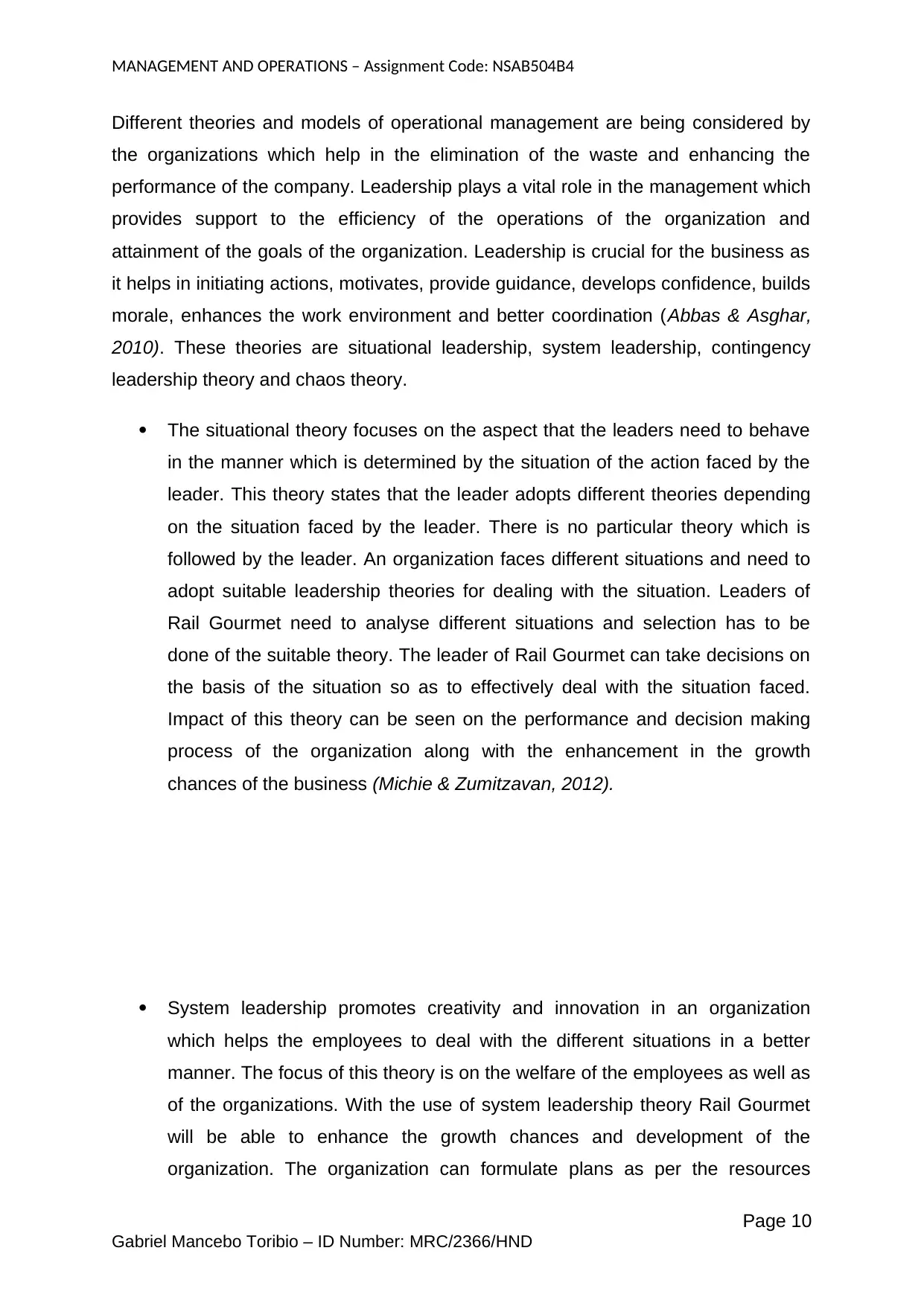
MANAGEMENT AND OPERATIONS – Assignment Code: NSAB504B4
Different theories and models of operational management are being considered by
the organizations which help in the elimination of the waste and enhancing the
performance of the company. Leadership plays a vital role in the management which
provides support to the efficiency of the operations of the organization and
attainment of the goals of the organization. Leadership is crucial for the business as
it helps in initiating actions, motivates, provide guidance, develops confidence, builds
morale, enhances the work environment and better coordination (Abbas & Asghar,
2010). These theories are situational leadership, system leadership, contingency
leadership theory and chaos theory.
The situational theory focuses on the aspect that the leaders need to behave
in the manner which is determined by the situation of the action faced by the
leader. This theory states that the leader adopts different theories depending
on the situation faced by the leader. There is no particular theory which is
followed by the leader. An organization faces different situations and need to
adopt suitable leadership theories for dealing with the situation. Leaders of
Rail Gourmet need to analyse different situations and selection has to be
done of the suitable theory. The leader of Rail Gourmet can take decisions on
the basis of the situation so as to effectively deal with the situation faced.
Impact of this theory can be seen on the performance and decision making
process of the organization along with the enhancement in the growth
chances of the business (Michie & Zumitzavan, 2012).
System leadership promotes creativity and innovation in an organization
which helps the employees to deal with the different situations in a better
manner. The focus of this theory is on the welfare of the employees as well as
of the organizations. With the use of system leadership theory Rail Gourmet
will be able to enhance the growth chances and development of the
organization. The organization can formulate plans as per the resources
Page 10
Gabriel Mancebo Toribio – ID Number: MRC/2366/HND
Different theories and models of operational management are being considered by
the organizations which help in the elimination of the waste and enhancing the
performance of the company. Leadership plays a vital role in the management which
provides support to the efficiency of the operations of the organization and
attainment of the goals of the organization. Leadership is crucial for the business as
it helps in initiating actions, motivates, provide guidance, develops confidence, builds
morale, enhances the work environment and better coordination (Abbas & Asghar,
2010). These theories are situational leadership, system leadership, contingency
leadership theory and chaos theory.
The situational theory focuses on the aspect that the leaders need to behave
in the manner which is determined by the situation of the action faced by the
leader. This theory states that the leader adopts different theories depending
on the situation faced by the leader. There is no particular theory which is
followed by the leader. An organization faces different situations and need to
adopt suitable leadership theories for dealing with the situation. Leaders of
Rail Gourmet need to analyse different situations and selection has to be
done of the suitable theory. The leader of Rail Gourmet can take decisions on
the basis of the situation so as to effectively deal with the situation faced.
Impact of this theory can be seen on the performance and decision making
process of the organization along with the enhancement in the growth
chances of the business (Michie & Zumitzavan, 2012).
System leadership promotes creativity and innovation in an organization
which helps the employees to deal with the different situations in a better
manner. The focus of this theory is on the welfare of the employees as well as
of the organizations. With the use of system leadership theory Rail Gourmet
will be able to enhance the growth chances and development of the
organization. The organization can formulate plans as per the resources
Page 10
Gabriel Mancebo Toribio – ID Number: MRC/2366/HND
Paraphrase This Document
Need a fresh take? Get an instant paraphrase of this document with our AI Paraphraser
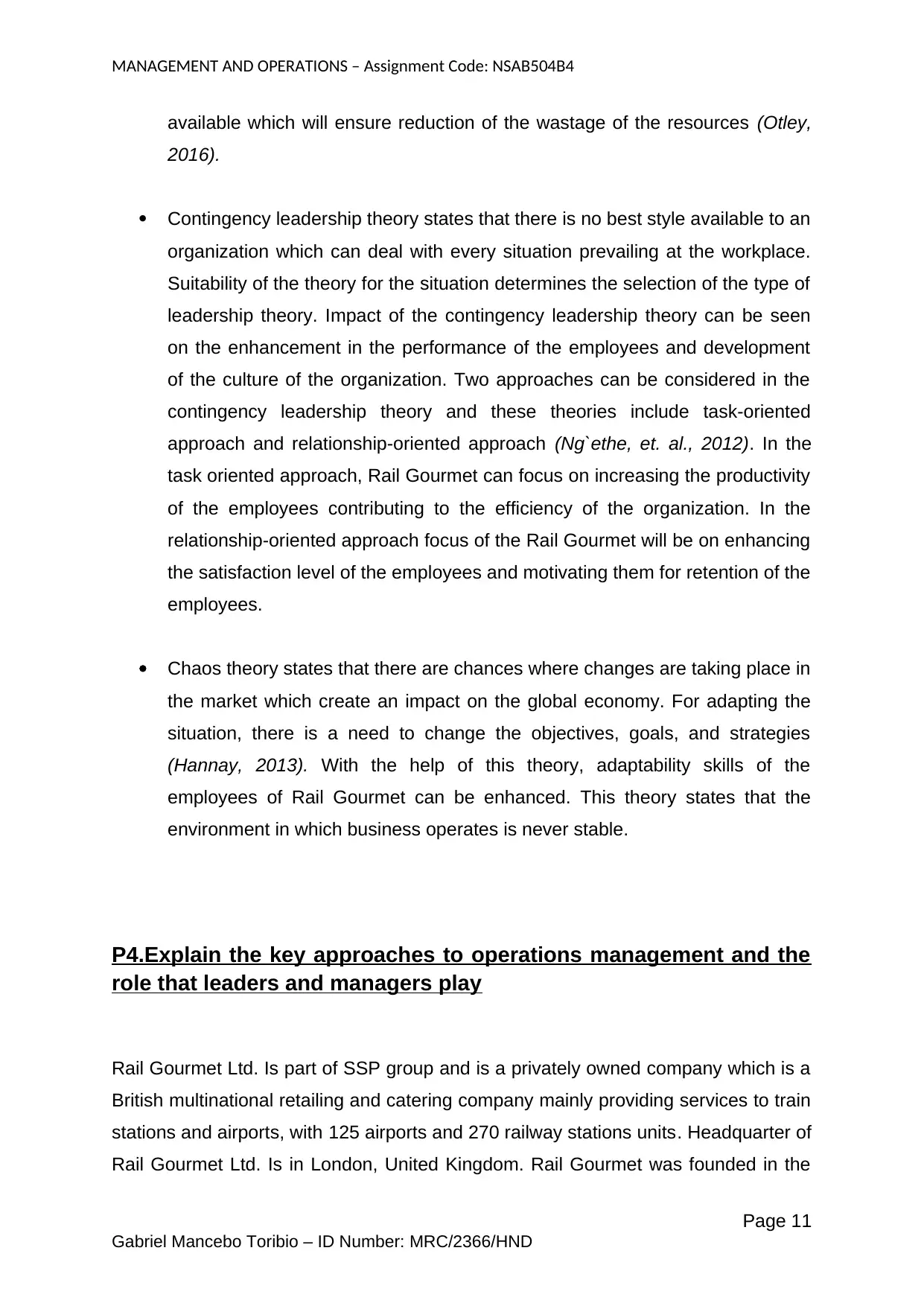
MANAGEMENT AND OPERATIONS – Assignment Code: NSAB504B4
available which will ensure reduction of the wastage of the resources (Otley,
2016).
Contingency leadership theory states that there is no best style available to an
organization which can deal with every situation prevailing at the workplace.
Suitability of the theory for the situation determines the selection of the type of
leadership theory. Impact of the contingency leadership theory can be seen
on the enhancement in the performance of the employees and development
of the culture of the organization. Two approaches can be considered in the
contingency leadership theory and these theories include task-oriented
approach and relationship-oriented approach (Ng`ethe, et. al., 2012). In the
task oriented approach, Rail Gourmet can focus on increasing the productivity
of the employees contributing to the efficiency of the organization. In the
relationship-oriented approach focus of the Rail Gourmet will be on enhancing
the satisfaction level of the employees and motivating them for retention of the
employees.
Chaos theory states that there are chances where changes are taking place in
the market which create an impact on the global economy. For adapting the
situation, there is a need to change the objectives, goals, and strategies
(Hannay, 2013). With the help of this theory, adaptability skills of the
employees of Rail Gourmet can be enhanced. This theory states that the
environment in which business operates is never stable.
P4.Explain the key approaches to operations management and the
role that leaders and managers play
Rail Gourmet Ltd. Is part of SSP group and is a privately owned company which is a
British multinational retailing and catering company mainly providing services to train
stations and airports, with 125 airports and 270 railway stations units. Headquarter of
Rail Gourmet Ltd. Is in London, United Kingdom. Rail Gourmet was founded in the
Page 11
Gabriel Mancebo Toribio – ID Number: MRC/2366/HND
available which will ensure reduction of the wastage of the resources (Otley,
2016).
Contingency leadership theory states that there is no best style available to an
organization which can deal with every situation prevailing at the workplace.
Suitability of the theory for the situation determines the selection of the type of
leadership theory. Impact of the contingency leadership theory can be seen
on the enhancement in the performance of the employees and development
of the culture of the organization. Two approaches can be considered in the
contingency leadership theory and these theories include task-oriented
approach and relationship-oriented approach (Ng`ethe, et. al., 2012). In the
task oriented approach, Rail Gourmet can focus on increasing the productivity
of the employees contributing to the efficiency of the organization. In the
relationship-oriented approach focus of the Rail Gourmet will be on enhancing
the satisfaction level of the employees and motivating them for retention of the
employees.
Chaos theory states that there are chances where changes are taking place in
the market which create an impact on the global economy. For adapting the
situation, there is a need to change the objectives, goals, and strategies
(Hannay, 2013). With the help of this theory, adaptability skills of the
employees of Rail Gourmet can be enhanced. This theory states that the
environment in which business operates is never stable.
P4.Explain the key approaches to operations management and the
role that leaders and managers play
Rail Gourmet Ltd. Is part of SSP group and is a privately owned company which is a
British multinational retailing and catering company mainly providing services to train
stations and airports, with 125 airports and 270 railway stations units. Headquarter of
Rail Gourmet Ltd. Is in London, United Kingdom. Rail Gourmet was founded in the
Page 11
Gabriel Mancebo Toribio – ID Number: MRC/2366/HND
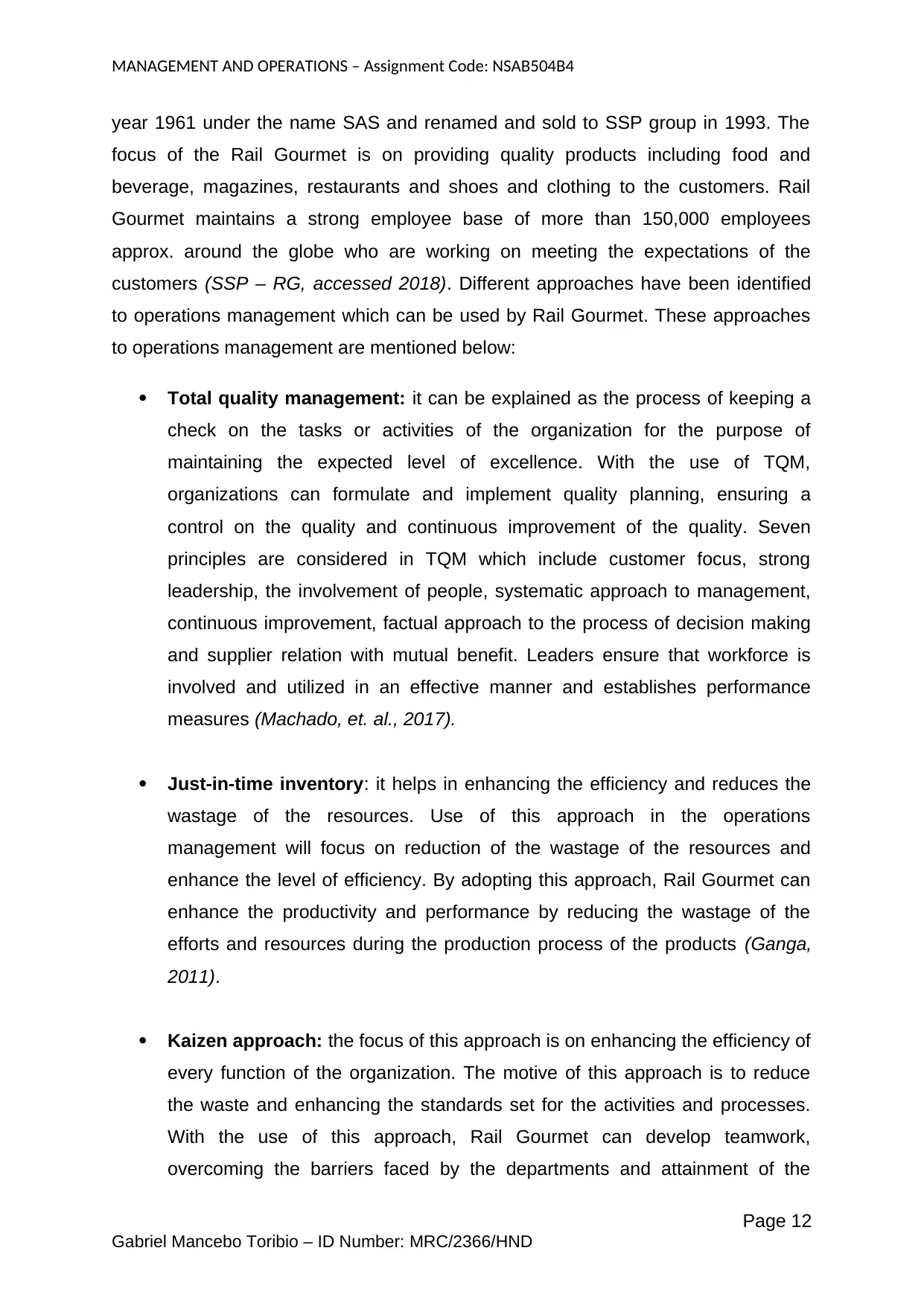
MANAGEMENT AND OPERATIONS – Assignment Code: NSAB504B4
year 1961 under the name SAS and renamed and sold to SSP group in 1993. The
focus of the Rail Gourmet is on providing quality products including food and
beverage, magazines, restaurants and shoes and clothing to the customers. Rail
Gourmet maintains a strong employee base of more than 150,000 employees
approx. around the globe who are working on meeting the expectations of the
customers (SSP – RG, accessed 2018). Different approaches have been identified
to operations management which can be used by Rail Gourmet. These approaches
to operations management are mentioned below:
Total quality management: it can be explained as the process of keeping a
check on the tasks or activities of the organization for the purpose of
maintaining the expected level of excellence. With the use of TQM,
organizations can formulate and implement quality planning, ensuring a
control on the quality and continuous improvement of the quality. Seven
principles are considered in TQM which include customer focus, strong
leadership, the involvement of people, systematic approach to management,
continuous improvement, factual approach to the process of decision making
and supplier relation with mutual benefit. Leaders ensure that workforce is
involved and utilized in an effective manner and establishes performance
measures (Machado, et. al., 2017).
Just-in-time inventory: it helps in enhancing the efficiency and reduces the
wastage of the resources. Use of this approach in the operations
management will focus on reduction of the wastage of the resources and
enhance the level of efficiency. By adopting this approach, Rail Gourmet can
enhance the productivity and performance by reducing the wastage of the
efforts and resources during the production process of the products (Ganga,
2011).
Kaizen approach: the focus of this approach is on enhancing the efficiency of
every function of the organization. The motive of this approach is to reduce
the waste and enhancing the standards set for the activities and processes.
With the use of this approach, Rail Gourmet can develop teamwork,
overcoming the barriers faced by the departments and attainment of the
Page 12
Gabriel Mancebo Toribio – ID Number: MRC/2366/HND
year 1961 under the name SAS and renamed and sold to SSP group in 1993. The
focus of the Rail Gourmet is on providing quality products including food and
beverage, magazines, restaurants and shoes and clothing to the customers. Rail
Gourmet maintains a strong employee base of more than 150,000 employees
approx. around the globe who are working on meeting the expectations of the
customers (SSP – RG, accessed 2018). Different approaches have been identified
to operations management which can be used by Rail Gourmet. These approaches
to operations management are mentioned below:
Total quality management: it can be explained as the process of keeping a
check on the tasks or activities of the organization for the purpose of
maintaining the expected level of excellence. With the use of TQM,
organizations can formulate and implement quality planning, ensuring a
control on the quality and continuous improvement of the quality. Seven
principles are considered in TQM which include customer focus, strong
leadership, the involvement of people, systematic approach to management,
continuous improvement, factual approach to the process of decision making
and supplier relation with mutual benefit. Leaders ensure that workforce is
involved and utilized in an effective manner and establishes performance
measures (Machado, et. al., 2017).
Just-in-time inventory: it helps in enhancing the efficiency and reduces the
wastage of the resources. Use of this approach in the operations
management will focus on reduction of the wastage of the resources and
enhance the level of efficiency. By adopting this approach, Rail Gourmet can
enhance the productivity and performance by reducing the wastage of the
efforts and resources during the production process of the products (Ganga,
2011).
Kaizen approach: the focus of this approach is on enhancing the efficiency of
every function of the organization. The motive of this approach is to reduce
the waste and enhancing the standards set for the activities and processes.
With the use of this approach, Rail Gourmet can develop teamwork,
overcoming the barriers faced by the departments and attainment of the
Page 12
Gabriel Mancebo Toribio – ID Number: MRC/2366/HND
⊘ This is a preview!⊘
Do you want full access?
Subscribe today to unlock all pages.

Trusted by 1+ million students worldwide
1 out of 26
Related Documents
Your All-in-One AI-Powered Toolkit for Academic Success.
+13062052269
info@desklib.com
Available 24*7 on WhatsApp / Email
![[object Object]](/_next/static/media/star-bottom.7253800d.svg)
Unlock your academic potential
Copyright © 2020–2026 A2Z Services. All Rights Reserved. Developed and managed by ZUCOL.





